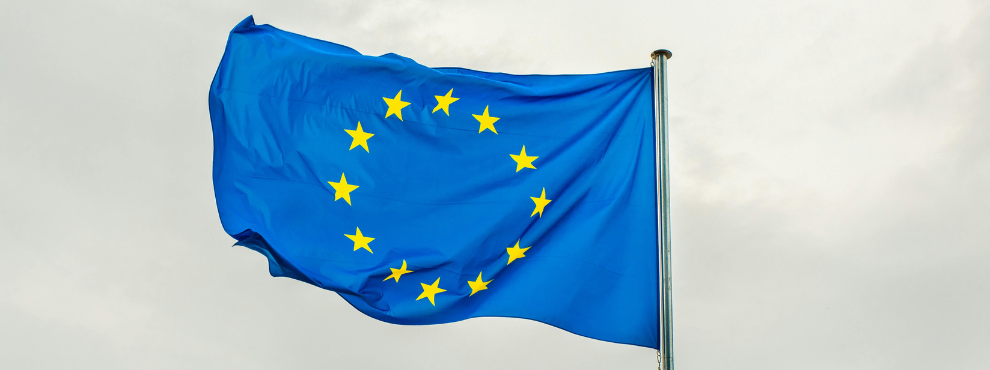European elections 2024: How crisis-proof is the European Union?
5 questions for Klaus Welle, former Secretary General of the EU Parliament.

A war on European soil, the climate crisis and the growing strength of far-right parties in the EU member states: What role will these challenges play in the upcoming European elections? And how crisis-proof is the European Union? We asked Klaus Welle these questions during his visit to Witten/Herdecke University, his alma mater. He studied economics here between 1987 and 1991.
Klaus Welle was Secretary-General of the European Parliament from 2009 to 2022. Today, he is Chairman of the Academic Council of the Martens Centre in Brussels and a visiting professor at the London School of Economics.
Europe has regularly faced new challenges over the past 15 years: The financial and debt crisis in 2008, the refugee migration in 2015, the Brexit referendum in 2016 and finally the corona pandemic and the Russian war of aggression on Ukraine. In your opinion, how has the EU fared in overcoming the most recent crises and what challenges will dominate the next legislative period?
In the case of both the coronavirus pandemic and the Russian war of aggression, we are talking about crises in Europe, but not crises in the EU.
With the "Next Generation EU" economic stimulus package, the member states provided the necessary funds of 750 billion euros in the summer of 2020, just a few months after the start of the pandemic, to overcome the economic and social consequences of the Covid crisis.
The EU states and institutions reacted just as quickly and decisively to Russia's invasion of Ukraine: After just two days, the EU imposed sanctions packages against Russia. Within two weeks, Ukraine was docked to the European energy system. With its measures, the EU has played a key role in the defence against this aggression. The entire geopolitical situation will continue to be a central theme of European policy over the next five years. The EU must strengthen its sovereignty and its defence! Especially in view of Russia, China and the uncertain outcome of the upcoming US election, Europe is a potential conflict zone that needs to be secured.
A greater - planetary - threat is the climate crisis. The EU has adopted ambitious targets to counteract this. The real challenge now, however, is the practical implementation, in particular the financing. Should the necessary funds come from the public coffers of the member states or will there be "Next Generation EU 2.0"? The issue has potential for conflict. Necessary climate protection measures must be socially acceptable.
Which decisive factors protect the stability of the alliance of states?
The willingness to strike a balance was and is crucial for the successful cooperation of the European Union. Solutions to common problems can only be found through negotiations at eye level and compromises. Another stabilising factor is the transatlantic partnership with the USA, which also manifests itself in NATO. Today, the European Union is above all a community of values that represents its member states and their citizens.
A decisive - and perhaps also advantageous - difference between the European Parliament and the German Bundestag is that there are no fixed coalitions in the EU Parliament and therefore no constant opposition. The individual political groups can form new alliances of interests for each draft bill. This leaves less room for polarisation.
A continental democracy cannot be organised 51% against 49%.
Young people aged 16 and over are entitled to vote for the first time. How will this change affect the election?
Voter turnout is usually lowest in the younger age group. We also saw this in the 2016 Brexit referendum. Only a few young Brits, who are predominantly pro-Europe, voted. By leaving the EU, they had to forfeit many of their freedoms. This experience was an important lesson for many EU citizens and shows that we should definitely make use of our right to co-determination.
Many young people seem unable to grasp the extent to which EU policy affects them personally. The European Parliament not only deals with major global political issues, but also with everyday aspects that have a local impact and also influence the reality of life for young people and young adults.
Have you noticed an overall development in voter turnout in recent years? If so, what has changed?
Overall, we have observed a positive trend in voter turnout. In 2019, the turnout was 51% - an increase of 8% compared to the previous election. Current poll figures even predict a further increase this year. There are several reasons for this.
- Just 20 years ago, many voters probably saw no personal connection to the more technical issues of European politics at the time. Voter turnout was correspondingly low. Today, EU citizens understand that the issues that concern them personally - such as the climate crisis or the war in Ukraine - take place at a European level. With their vote, they can influence how the EU deals with these issues.
- In 2014, the European Union introduced the Spitzenkandidaten principle for the European elections, which we are also familiar with from the Bundestag elections. This has given the election a personal component and greater media attention. The candidates can already introduce themselves to voters during the election campaign and convince them.
- The parties on the right also have an influence, as they are able to mobilise non-voters.
Not only in Germany, but across Europe, we are observing that right-wing parties are becoming ever stronger. What do you see as the reasons for the shift to the right and what influence will this have on the European elections?
Right-wing extremist parties are focussing on nationalism. They promise protection through isolation, which makes them particularly attractive to those who feel left behind by globalisation. We have seen this in the USA with Donald Trump, in France with Marine Le Pen and in Germany with the AfD.
The European elections are like a mirror of the political mood in the individual member states. You can pretty much deduce the composition of the EU Parliament from national poll results. The EPP (European People's Party), the Social Democrats and the Liberals traditionally form the stabilising centre of the Parliament. Forecasts currently predict that 40 seats to the left of the EPP will be lost in the election and 55 seats to the right to extreme right will be added.
(Note: 15 additional MEPs will be elected in June 2024, so that the Parliament will grow from 705 to 720 seats).
The spectrum of the stabilising centre will be weakened by the strengthening of the outer borders. Despite this development, the centre will remain strong enough for most parliamentary decisions to be taken via the three political groups (EPP, Social Democrats, Liberals).
Further information:
What is the European Union doing for a better Europe? How does it work in my region and what impact does EU policy have on my daily life? On the interactive website What Europe does for me, citizens can find out about specific EU projects and measures that are happening on their doorstep and that concern the issues that affect them in their everyday lives.
Photos for download
Contact person

Miriam Kreimeyer
Communications Officer
Administration | Communication & Marketing
Alfred-Herrhausen-Straße 48
58455 Witten
Room number: 2.F05
